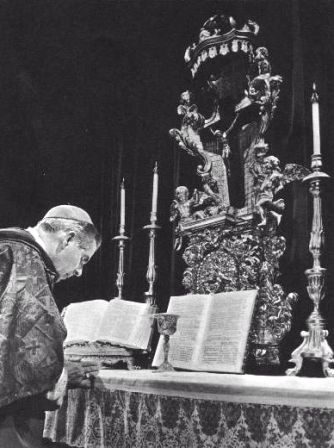 I just completed an article for The Wanderer. In this week’s offering I delved into the first of the priest’s possible preparatory prayers before Holy Communion during Mass.
I just completed an article for The Wanderer. In this week’s offering I delved into the first of the priest’s possible preparatory prayers before Holy Communion during Mass.
In this preparatory prayer we find the phrase “a te numquam separari permittas… let me never be separated from You”.
As part of the article I added the following:
That phrase “a te numquam separari permittas… let me never be parted from Thee” will be familiar to those who pray the Stations or Way of the Cross according to the method composed by St. Alphonsus Liguori (+1787). A woman, Dhuoda, married to Duke Bernard of Septimania in 824, used the phrase in her Liber manualis quem ad filium suum transmisit Wilhelmum, 4,8. Thomas a Kempis (+1471) uses it in the Imitation of Christ, 1,1. The phrase is also found in the Anima Christi, once attributed to St. Ignatius of Loyola (+1556), but which comes from at least the 14th century. The priest used to say it during every Mass. In the Novus Ordo it is an option.
Nothing is more terrifying than separation from God. Nothing that can happen to the body in life is as bad as dying in the state of mortal sin. When we sin, we separate ourselves from God. If we die in that state, that is how we remain: separated. That is the essence of the state called Hell, and all Hell’s unending agony derives from that separation. Break God’s commandments, separate yourself from God.
“Free me by this your most holy Body and Blood from all my sins and from every evil; keep me always faithful to your commandments, and never let me be parted from you.”
Amen.


































When, several years ago, I heard Fr. James Fryar FSSP say in his reflections on his first solemn high Mass, that the numquam separari was his favorite personal Mass prayer, I adopted it as mine too. Now I have it printed out (Latin-English) on a small piece of paper tucked into my OF Mass book, and say it right after the Ecce, Agnus Dei at every Novus Ordo Mass. (Actually, it’s already there in my Latin-English Mass ordinary, but rather than use the pallid ICEL English translation, I copied the one from an EF missal.)
I’ve been praying the Anima Christi after Mass, as a part of my prayers of thanksgiving, for years. I didn’t know this phrase was also present as a mandatory prayer in the 1962 (and previous) missal, nor that it is an optional prayer in the Novus Ordo. Although, a retired priest from my former parish used to say this prayer just before self-communicating following the consecration. I always pause when saying this phrase in the Anima Christi, because of the sense of dread it invokes, considering what it means to be separated from God. Knowing that this is also a priestly prayer that is said during Mass gives it a new depth. Thank you for highlighting this, Father.
What a beautiful prayer!!
I wish more Priests weren’t afraid of hurting people’s feelings and tell them the truth about the reality of hell.
God bless
Catherine
In te Domine speravi; non confundar in aeternum.
I have question that some of our Eastern Christian commenters could tackle. Fr. Z just posted that hell is separation from God. I know that there are many Eastern Christians (Catholic and Orthodox) who take the view of Isaac the Syrian who held the theory that the just and the wicked all feel the same all consuming Fire of God but that the just feel it as warmth and the wicked are punished by it. In essence there is no separation from God, ever.
http://www.google.com/search?q=isaac+the+syrian%2Bhell&ie=utf-8&oe=utf-8&aq=t&rls=org.mozilla:en-US:official&client=firefox-a
It also appears that Isaac the Syrian held the theory that everyone will be saved .
http://www.insidethevatican.com/newsflash/2008/newsflash-apr8-08.htm
“It also appears that Isaac the Syrian held the theory that everyone will be saved .”
Oh. Well I take back the ‘non confundar in aeternum’ in that case.
The idea of eventual universal salvation was definitely around in the early Church (St Gregory of Nyssa held it, and St Augustine – while sharply disputing it – says it was common in his day), but I believe it, or at least the particular form which held that souls in hell could repent and be restored to heaven, was condemned by some council. (Though I cannot find which one — it doesn’t seem to be 2nd Constantinople as sometimes stated…)
I’ve said both the prayer before Communion and the Anima Christi, in Latin, over and over again for years, and have never noticed this. I’ll have to pay closer attention next time I go to Mass.
I am just rereading Dante’s Comedy (in translation) and am wondering how characteristic (or not) his treatment of Limbo is. It would seem that what the virtuous pagans (notably including Saladin, Avicenna and Averroes: canto 4) and the unbaptized offspring of Christians suffer is exactly and (so to put it) simply a distinct separation from God, neither enjoying the Beatific Vision nor undergoing purgatorial preparation to do so.
Obviously a very different situation from that of any Baptized person who could pray “a te numquam separari permittas”, and yet a being forever sustained in what is in some sense a knowable and known “separation”.
St. Gregory of Nyssa said that his elder sister St. Macrina the Younger taught the fire/God’s love thing, but she held that God’s love burned away all that was not like God. (Which takes care of Heaven/Purgatory and “saved as though through fire”.) If you were wicked enough, you would burn completely away, and that was Hell.
St. Macrina the Younger died in 379. Isaac the Syrian was three or four centuries later, and didn’t teach about robots as a proof of God like Macrina did, either. Advantage: Macrina.